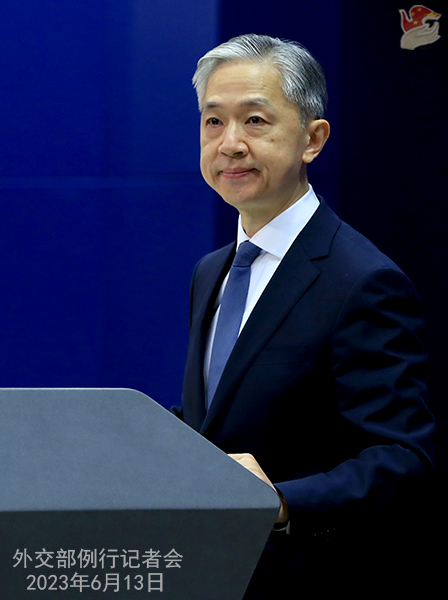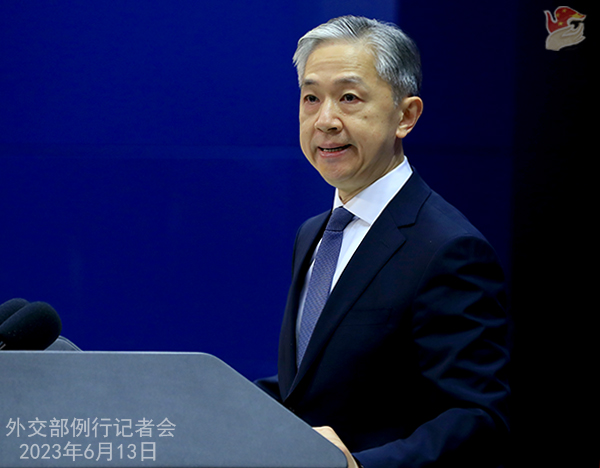| Foreign Ministry Spokesperson Wang Wenbin’s Regular Press Conference on June 13, 2023 |
| 2023-06-13 19:23 |
|
Yonhap News Agency: ROK President Yoon Suk Yeol said during a cabinet meeting on June 13 that looking at the attitude of Chinese Ambassador to the ROK Xing Haiming, it’s doubtful whether he has an attitude of mutual respect or promotion of friendship as a diplomat. The office of the ROK President said that they are waiting for China to think over this issue and take appropriate measures. What is China’s position on this? Wang Wenbin: I noted the ROK side’s remarks and also noted that some ROK media outlets have made reports that are inconsistent with facts or even amount to personal attacks on Ambassador Xing Haiming. I deeply regret this. I would like to stress once again that it is part of Ambassador Xing Haiming’s job to engage extensively with people from various walks of life in the ROK with an aim of increasing understanding, promoting cooperation and advancing China-ROK relations. There is no point in making an issue of this. A sound and steady China-ROK relationship serves the common interests of both sides. We hope the ROK will work actively with China towards this end. CCTV: According to reports, the US State Department spokesperson recently said that the US had delivered a letter to UNESCO informing it that the US has decided to rejoin the organization. Yesterday, UNESCO Director-General Audrey Azoulay announced the US’s request to representatives of member states. What’s China’s comment on the US seeking re-admission to UNESCO? Wang Wenbin: We noted relevant US statement. We hope this time the US decision is made out of a sense of responsibility and aimed at supporting multilateralism and contributing to international cooperation. The US withdrew twice from UNESCO, which had a negative impact on the organization’s work. The membership of an international organization is something that should be taken seriously. If the US is serious about what it means to rejoin the organization, it needs to show the sincerity of observing international rules and respecting international rule of law, and earnestly fulfill its due international obligation as a responsible nation, including paying off its dues in arrears owed to UNESCO for years. International organizations are not parks. Countries can’t just come and go as they please. More importantly, the US must not view international organizations as places for geopolitical wrestling and pursue “global leadership” in the name of the interests of the international community.
China News Service: It is learned that the ASEAN Regional Forum Senior Officials’ Meeting will be held soon. Is there anything you can share with us about China’s participation in and expectation for the meeting? Wang Wenbin: The ASEAN Regional Forum (ARF) Senior Officials’ Meeting will be held via video link on June 14. Participants of the meeting will review the implementation of the outcomes of last year’s ARF Ministerial Meeting, discuss mechanism building and future development of the ARF, and exchange views on regional and international issues. Assistant Minister of Foreign Affairs Nong Rong will attend the meeting. This year marks the 30th anniversary of the ARF. China hopes that participating parties will build up consensus and enhance cooperation on the agenda of the ARF and this year’s theme of ASEAN, accumulate outcomes for this year’s ARF Ministerial Meeting, and make positive contribution to peace, development and prosperity of the region. Bloomberg: Can you confirm that the Chinese embassy in Poland has been talking to the Ministry of Culture and National Heritage there about an art show in Warsaw by an Australian artist? And if so, what is the desired outcome of such talks? Wang Wenbin: I am not aware of what you said. What I want to say is that cultural exchanges should be conducive to cultivating objective perception and growing friendship. TBS: Human rights NGOs have pointed out that overseas outposts of Chinese police are monitoring democratic activists and others in Japan, and there are some testimonies to this. Is this true? Do you have any comments on this? Wang Wenbin: We have made our position clear multiple times on this sort of rhetoric. I need to stress again that there is no so-called overseas police stations. China strictly follows the principle of non-interference in other countries’ internal affairs. China strictly abides by international law and respects all countries’ judicial sovereignty. We hope parties concerned will look at this factually and rationally and not dramatize it or make unwarranted accusations against China.
TASS: According to Shanghai Securities News, a senior executive of a Chinese photovoltaic enterprise was taken away from the Munich Airport by several men in uniform yesterday. The executive was expected to attend Intersolar Europe 2023 in Munich, Germany. What is China’s comment? Wang Wenbin: I have seen relevant reports. The Chinese embassy in Germany and the Chinese consulate-general in Munich immediately contacted the German side to learn about the situation and ask the German side to protect the lawful rights and interests of Chinese companies and individuals. We also noted that relevant industrial association has already issued a clarification. The Chinese government attaches great importance to the interests of overseas Chinese nationals and will continue to provide consular assistance in accordance with law. Bloomberg: US Treasury Secretary Janet Yellen is expected to testify on Capitol Hill on Tuesday and is set to praise institutions like the IMF and the World Bank as reflecting American values. Does the foreign ministry have a comment on this characterization or this sort of praise of the IMF and World Bank as reflecting American values? Wang Wenbin: The IMF and the World Bank are multilateral financial institutions and platforms that reflect democracy in international relations and advance international cooperation on the basis of fully taking into account the interests of all member states. The IMF is not the IMF of the United States, nor is the World Bank for that matter. Global Times: According to US media reports, German investigators obtained evidence suggesting explosions of the Nord Stream pipelines were carried out by a sabotage group. Other reports said that the US had received information on an attack plan against the pipelines three months before the sabotage. What’s your comment? Wang Wenbin: We have noted relevant reports. China has expressed on multiple occasions that safeguarding the security of vital infrastructure is a common concern of the international community. It is critically important to launch an objective, impartial and professional investigation into the explosions and hold those responsible to account. Eight months have passed since the explosion, yet the investigation process has been going slow. It is surprising that the US has remained silent this time, especially considering that it would usually use hotspot issues to portray itself as a so-called “beacon.” Take what the US has done to Syria for example. The turbulence in Syria began on April 22, 2011. On April 27, the US motioned to the UN, demanding that the UN Office of the High Commissioner for Human Rights (OHCHR) send an investigation mission to Syria for possible violation of International Human Rights Law. On April 29, the US announced that Syria had seriously violated human rights, and imposed sanctions on some individuals and entities in Syria. Within just a week, the US completed the entire process from investigation to sanctions. Since then, the US has further meddled in Syria through various means, including funding the “White Helmets” which fabricated so-called evidence, carrying out airstrikes against Syria, expanding its sanctions, and exerting pressure with its allies. Clearly, nothing could stop the US until it got what it wanted. Compared with its aggressive response on Syria, the US’s inaction on the Nord Stream pipeline explosions seems quite intriguing. Why has the US been silent? What cannot the US say about this? When exactly will the US respond to international doubts and concerns? The US owes the international community an explanation.
Bloomberg: A question on the US Commerce Department’s restriction of exports to entities that it says recruited Western pilots to train Chinese military personnel as well as some that developed hypersonic weapons. So this is in relation to the addition of new companies to the entity list as a result of them recruiting Western pilots to train Chinese military personnel. Does the foreign ministry have a comment on this? Wang Wenbin: To maintain its military and tech hegemony, the US has time and again overstretched the concept of national security and abused state power to go after Chinese companies, trampled on international trade order and global trade rules and destabilized global industrial and supply chains hysterically by all kinds of means. We firmly oppose these acts taken by the US and demand that it immediately stop using military and human rights-related issues as pretexts to politicize, instrumentalize and weaponize trade and tech issues, and stop abusing export control tools such as entity lists to keep Chinese companies down. China will continue to do what is necessary to firmly safeguard the lawful rights and interests of Chinese companies. Beijing Daily: According to reports, multiple sources have told the US news website The Messenger that driven by concerns over escalation of cross-Strait tensions, the US government is drafting plans to evacuate Americans from Taiwan, which include routes and destinations. Considering that Taiwan is quite sensitive to this, the US hasn’t made it public. What’s your comment on this? Wang Wenbin: I am not aware of what you mentioned. But I do know that though the US says it supports Taiwan, it has been using Taiwan as a pawn and the Taiwan people as cannon fodder to serve the US strategy of using Taiwan to contain China. The US even has a “plan for the destruction of Taiwan”. I believe the Taiwan people are able to see clearly how the US is actually seeking to harm Taiwan’s interest and even destroy Taiwan. Bloomberg: US Secretary of State Antony Blinken said former President Donald Trump’s administration didn’t do enough to counter Chinese efforts to boost intelligence gathering overseas. Does the foreign ministry have any comment on Secretary Blinken’s remarks? And relatedly, do you have any information or details to share about the planned visit by Secretary Blinken to China? Wang Wenbin: On your first question, I’ve stated China’s position on similar questions several times. The US has been taking the same page from its playbook and people are already quite familiar with it. We hope the US will take a hard look at itself, stop propagating rumors and smears, and stop being a champion of hacking with its indiscriminate surveillance on other countries. As to the visit you mentioned, I have answered similar questions and have nothing to add.
Dragon TV: It was reported yesterday that TEPCO started trial operation of the nuclear-contaminated water discharge facility at the Fukushima Daiichi Nuclear Power Plant, which will take two weeks. Japanese media assessed that the Japanese government will complete all preparation work for the discharge by the end of June and launch the discharge after the IAEA Task Force releases the final review report. What is your comment? Wang Wenbin: The Japanese government has begun the trial operation of the nuclear-contaminated water discharge facility. This means that Japan has taken another step towards pushing through the discharge despite international opposition. The discharge of nuclear-contaminated water bears on the global marine environment and public health and is by no means a domestic matter of Japan. What Japan has done in disregard of strong domestic and international opposition is both irresponsible and unlikely to get support. No matter how Japan tries to justify its discharge plan, it will not hide its attempt to shift risks. The discharge violates Japan’s obligations to protect and preserve the marine environment as outlined in UNCLOS and other international instruments. Discharge into the ocean is not the only option—and certainly not the safest and most optimized way—for treating the nuclear-contaminated water. By choosing this option out of consideration for economic cost, Japan is in fact spilling the risks of nuclear pollution to humanity all over the world. No lip service can change the reality. Japan has yet to prove that the discharge is safe and harmless. Data released by Japan shows that close to 70 percent of the treated water is not up to standard. However, Japan has created the pseudo-scientific term “treated water” in an attempt to cover up the unidentified risks of the plan. What consequences will it bring to the ecological environment, food safety and public health in Pacific rim countries if millions of tonnes of nuclear-contaminated water is dumped into the ocean? Japan has not fully provided scientific evidence and data in this regard. No blueprint can guarantee a project’s viability. The effectiveness and maturity of Japan’s treatment facility has received no third-party assessment or certification, and has repeatedly malfunctioned. The discharge will last 30 years or even longer. In the future, a huge amount of new nuclear contaminated water is expected to be created. Japan has been unable to prove the long-term reliability of the treatment facility, neither has it provided a systematic and comprehensive environment monitoring plan. Its current monitoring plan covers a very small area with few locations and low frequency of monitoring, which makes it difficult to promptly identify abnormal situation such as when the discharged water is not up to standard. I also want to stress that Japan cannot use the final review report of the IAEA Task Force as a “shield” from critics or “greenlight” for the discharge. As early as July 22 last year, the Japanese government officially approved the discharge plan and has since declared multiple times that it would not postpone the implementation of the plan. In fact, the Task Force has a very limited mandate as agreed between Japan and the IAEA, and is not authorized to evaluate other options than the discharge into the ocean. Therefore, no final report shall be used as an excuse for Japan to dump the nuclear-contaminated water into the ocean. China strongly urges Japan to faithfully fulfill its international obligations, stop pushing through the discharge plan, fully explore and evaluate the alternatives to ocean discharge to ensure that the nuclear-contaminated water is handled in a scientific, safe and transparent manner, and agree to rigorous international oversight. We hope Japan will stop taking the wrong steps in time. Spilt water cannot be gathered up again.
|
 | ||||||||||||
 | ||||||||||||
|





